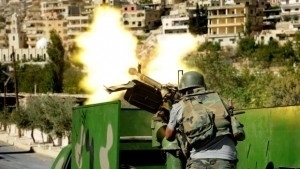An intense 10-day offensive by Syrian Government aircraft targeting Syria’s largest city Aleppo has forced many residents to escape to Lebanon, Free Syrian Army (FSA) Field Commander Abu Firas Al-Halabi told Asharq Al-Awsat.
He said that more than 100 barrel bombs a day—barrels filled with explosives such as TNT, or shots and nails—had been dropped on the city daily since the start of the offensive.
“Since the bombardment intensified around 10 days ago, we recorded more than 1,000 deaths, a large number of them unidentified, all killed by the explosive barrels,” he said.
While the 10 day bombardment has been fiercely criticized by foreign governments and human rights activists, estimates by the Syrian Observatory for Human Rights (SOHR) place the figures for the total killed since the start of the offensive at around 300.
Halabi said that the aircraft had been bombing the city from a height of around three miles, making it difficult for opposition fighters to respond to them, especially since they have often targeted the same area more than once. “Once medics and revolutionaries arrive to help the injured, the aircraft return and bomb again. The barrels kill indiscriminately for the sake of killing,” he said.
“An aircraft can only carry 800 kilograms of barrels, which is around two barrels, 400 kilograms each. There are barrels which contain explosives and gunpowder and others which contain shots and nails, these are called fission bombs,” he said. “When they explode they cause extensive damage to an area reaching 300 meters.”
“And when we talk about damage, we mean this barrel can destroy a five-storey residential building and four others along with it,” he told Asharq Al-Awsat.
The bombardment has forced many of Aleppo’s residents to flee to Lebanon and Turkey in order to escape the destruction.
Abu Amjad, a construction worker whose family reached Lebanon after escaping Aleppo with the help of opposition fighters, told Asharq Al-Awsat that his home and all his possessions had been destroyed, leaving him with no option but to escape “the impossible life caused by the lack of electricity and fuel.”
Abu Amjad’s friend Samir, who escaped to Lebanon via Homs, said that he and Abu Amjad had been forced to eat grass and drink contaminated water in the city, taking turns each night to stand guard and warn Homs residents about any snipers or bombing raids. “I do not want to return to Syria until the regime has been toppled and every criminal has been punished,” he said. “Why has Homs been ignored by the media and not been provided with aid, and why were safe routes not made available to reach it?”
Speaking about the explosive barrels bombing Aleppo, he said: “My city has gone past the barrel stage a long time ago. Today it is coming under heavier bombardment by military aircraft, not just by helicopters.”
......


